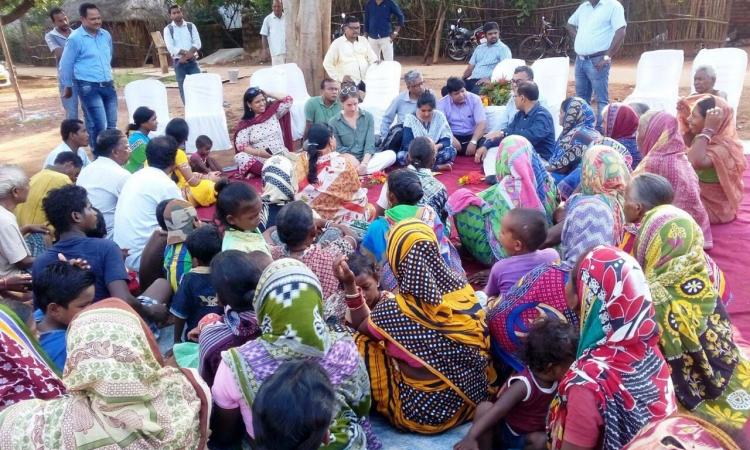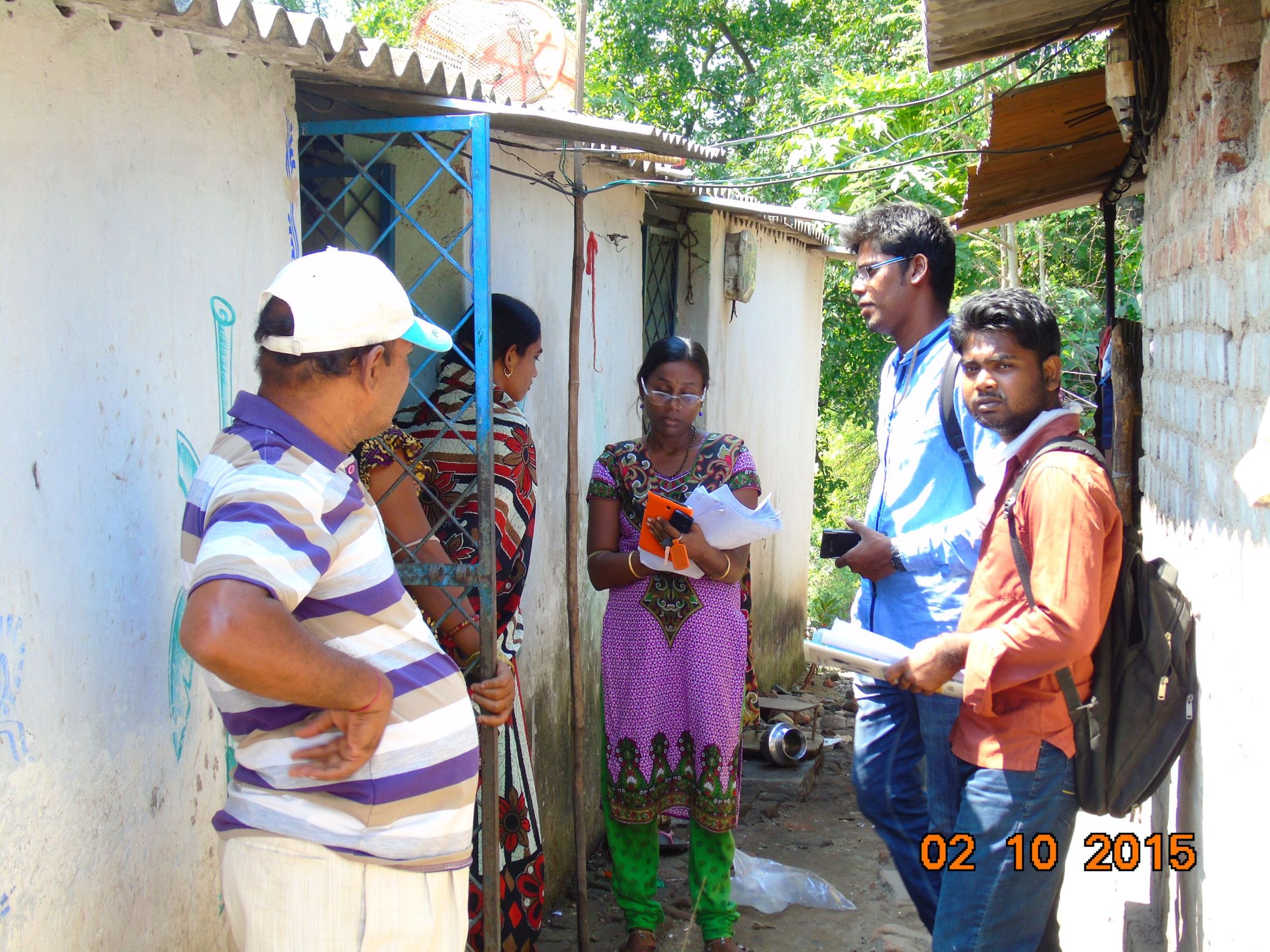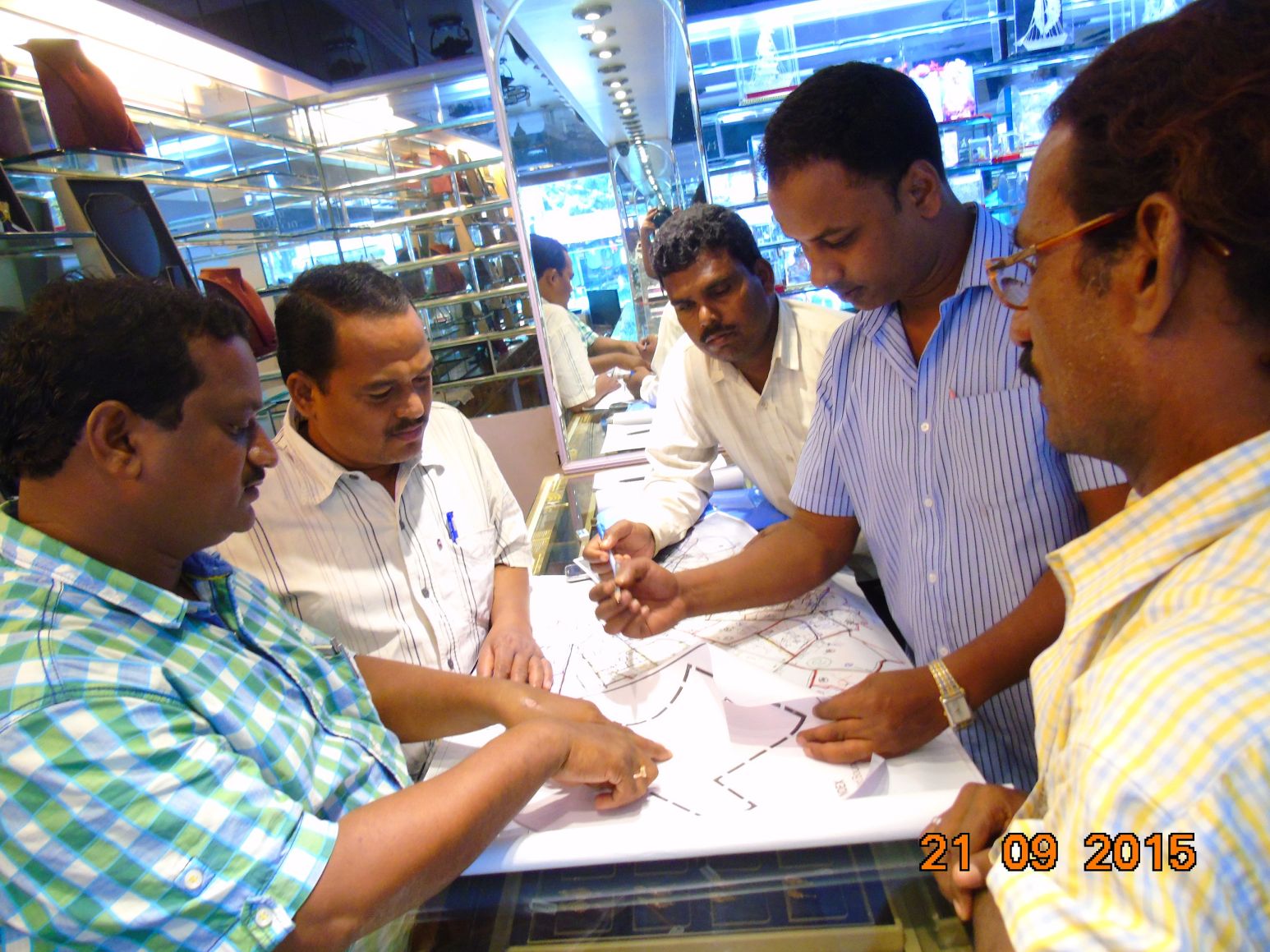
Tucked away in the slums of Dhenkanal, a small community offers a glimpse of how sanitation solutions have changed hundreds of lives for the better. Till recently, post rains in the absence of proper drainage, the clogged lanes were causing a lot of inconvenience to the residents of Parhatiya Sahi slum. In just one spell of rain, the water would form a patchwork of puddles that would take days to dry turning the area into a breeding ground of mosquitos. The work of the slum sanitation committee revolved around improving sanitation and development of proper drainage system in the locality.
The woes of Parhatiya Sahi like most slums in India are reflective of people's high dependence on onsite sanitation systems. The other issues are lack of an efficient system for emptying/desludging, transportation, treatment and disposal of faecal waste. The slum sanitation committee of Parhatiya Sahi worked with the Dhenkanal municipality to secure services that have improved the quality of life in the slum, including getting the municipality to construct cemented lanes, a community toilet and install streetlights, in addition to better water and sanitation services.
All this was done under Project Nirmal, which worked on the demonstration of appropriate, low-cost, decentralized, inclusive and sustainable sanitation service delivery solutions for two small towns (Angul and Dhenkanal) in Odisha leading to improved sanitation access for all households and integration of faecal sludge management (FSM) in the sanitation value chain, through enabling institutional and financial arrangements and increased private sector participation.
State of urban sanitation in Odisha
Odisha, one of the least urbanised states in the country is marked by inadequate access to sanitation, high open defecation and over-reliance on onsite sanitation systems. In 2011, all 114 urban centres in the state, had very poor access to sanitation facilities and approximately 35 per cent of urban households lacked access to individual household latrines.
Among the 65 per cent of urban households that had individual household latrines, only 11.5 per cent were connected to sewerage systems, while a majority (52 per cent) relied on septic tanks and other onsite sanitation systems (including pit latrines). It was estimated that less than 2 per cent of the faecal sludge generated was being treated through sewage treatment plants (STPs).

While septic tanks and pit latrines were predominant in the state’s urban areas, prevalent practices pointed to deficiencies in the construction of containment structures, irregular emptying, inadequate desludging and cesspool services (provided by urban local bodies and/or private operators) for collection and transportation of septage, as well as lack of faecal sludge treatment and disposal facilities. It was estimated that septage from less than half of the households that relied on septic tanks was being collected safely. Untreated faecal sludge and septage, thus, was finding its way into drains and open areas, leading to pollution of water bodies.

In this background, it was apparent that Odisha needed faecal sludge and septage management (FSSM) to be at the centre of all its policies, programs and schemes along with ensuring improved access to safe sanitation facilities for all.
The state would also benefit from a demonstration of alternative decentralized options for collection, transportation, treatment and disposal of faecal sludge and septage; participatory techniques for planning urban sanitation infrastructure and robust institutional arrangements for effective sanitation service delivery.
Developments related to urban sanitation
Shadowing the work on urban sanitation at the international and national level, rural and public toilet grants were given out under “Project Samaan” in Odisha in 2010 to provide adequate and suitably designed sanitation facilities for urban poor households in Bhubaneshwar and Cuttack with support from the Bill and Melinda Gates Foundation (BMGF).
 A study in 2013 on sanitation landscaping of nine urban centres by Practical Action brought to light the need for ensuring universal access to sanitation facilities and provision of adequate FSM services. It also recommended the need for creating awareness among urban households on safe sanitation and hygiene practices; capacity building of urban local body staff on FSSM and demonstrating implementation of innovative decentralised pilot programs for the safe management of faecal waste.
A study in 2013 on sanitation landscaping of nine urban centres by Practical Action brought to light the need for ensuring universal access to sanitation facilities and provision of adequate FSM services. It also recommended the need for creating awareness among urban households on safe sanitation and hygiene practices; capacity building of urban local body staff on FSSM and demonstrating implementation of innovative decentralised pilot programs for the safe management of faecal waste.
Further, in 2014, under the ambit of the Scaling up City Institutions for India (SCI-FI) Project, Centre for Policy Research (CPR), undertook geographical information system based mapping of sanitation facilities in Balasore. At the national level, urban sanitation received a renewed focus in 2014 with the launch of the Swacch Bharat Mission-Urban (SBM-U) which set out to make urban India open defecation free by October 2019.
In Odisha, advocacy efforts related to ensuring adequate and safe sanitation facilities and wastewater management gained momentum. The Additional Chief Secretary, Housing and Urban Development Department (HUDD), Government of Odisha (GoO) made a strong case for effective FSSM in the state and the need for piloting decentralized solutions.
Project Nirmal: Conceptualization
Project Nirmal was conceptualized as a response to the emerging need for decentralized, low cost and scientific management of faecal sludge and septage in Odisha. It was designed based on a co-production approach which aims at enabling providers and users of services opportunities to share power and responsibility and to wosrk together in equal, reciprocal and caring relationships.
 The project, thus, has at its core the community engagement structures at slum and ward level and has active participation of State, district and local agencies, including HUDD, GoO; District Administration of Angul and Dhenkanal districts; and Angul and Dhenkanal Municipalities.
The project, thus, has at its core the community engagement structures at slum and ward level and has active participation of State, district and local agencies, including HUDD, GoO; District Administration of Angul and Dhenkanal districts; and Angul and Dhenkanal Municipalities.
A consortium of organizations including Practical Action, Bhubaneswar and CPR, New Delhi with funding support from BMGF and Arghyam has supported this project. Based on GoO’s recommendations, Angul and Dhenkanal Municipalities were selected for project implementation.
Project Nirmal was aimed at piloting appropriate, low-cost, decentralized, inclusive and sustainable sanitation service delivery solutions for small and medium towns, that would lead to improved sanitation access for all households and integrate FSSM. While the project was implemented in two towns namely, Angul and Dhenkanal, it was envisaged that the learnings from its implementation would inform frameworks (legal, financial, institutional, community participation) required at the state and national levels to ensure replicability and scaling up of this approach.
A research learning note 'Project Nirmal: Implementing Decentralized Solutions for Sanitation In Small Towns' deals with the Project Components, Project Outcomes, Project Phases, Project Monitoring Structures and details related to the Project Implementation Towns – Angul and Dhenkanal.
The project was completed in 2020 and was implemented by Centre for Policy Research and Practical Action with support from Bill and Melinda Gates Foundation; Arghyam; Housing and Urban Development, Government of Odisha; and Municipalities of Angul and Dhenkanal.
The article is a part of the series demonstrating learning and outcomes of the Project Nirmal based on Scaling City Institution for India (SCI-FI)’s research on water and sanitation. More on the series: https://twitter.com/CPR_SCIFI